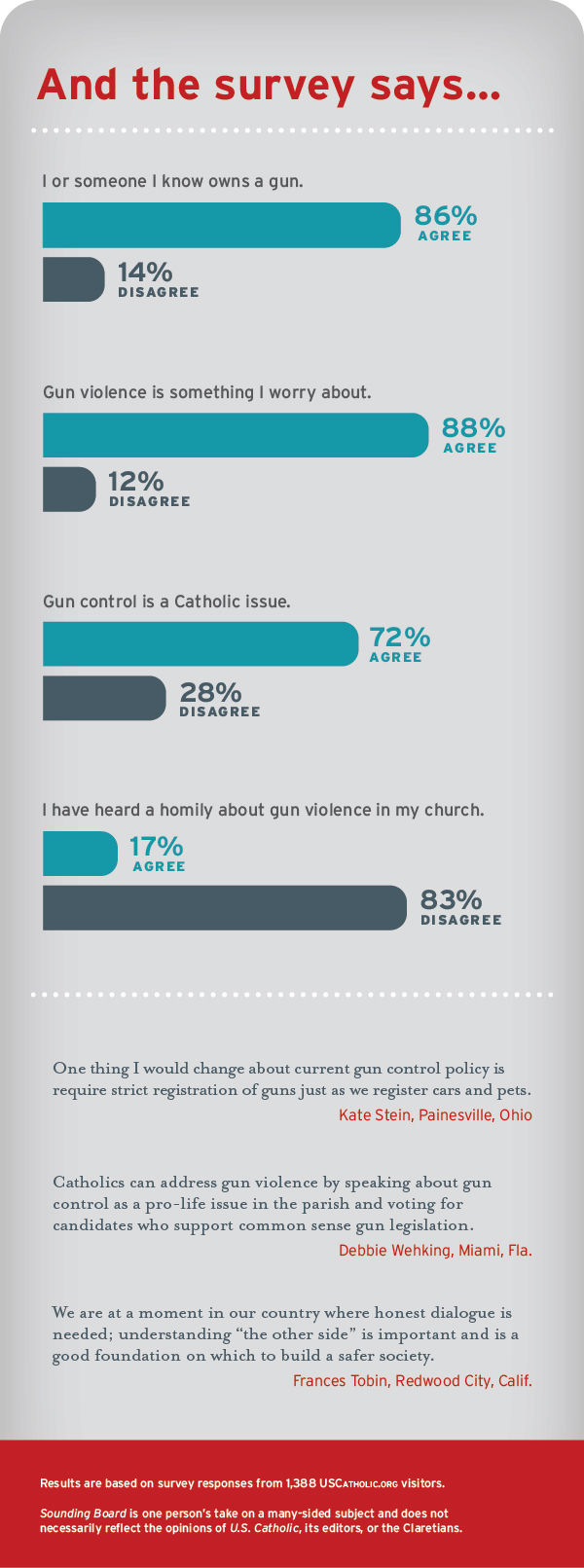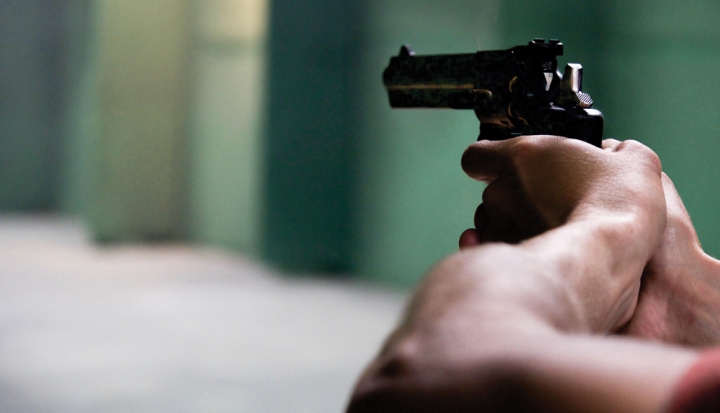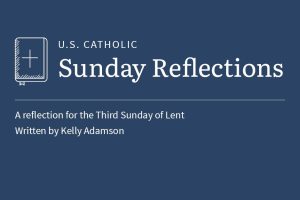America has a complicated relationship with guns. Gun violence is a commonplace and everyday occurrence; gun control is one of the most highly debated issues nationwide. U.S. Catholic surveyed our readers to find out where they stand on this divisive topic and what they think the future holds for us as a country—and a church—when it comes to guns.
Of the 1,388 U.S. Catholic readers surveyed, 86 percent either own a gun or know someone who does. “I’ve had one my entire life,” says Richard Moser of Gilbert, Arizona. “It’s part of my heritage.” Likewise, Kathy Cook of Fairborn, Ohio says that her “family has always owned guns. We were poor when I grew up and hunted to put food on the table.”
Like Kathy’s family, 32 percent of readers who own or know someone who owns a gun have it primarily for hunting. For many readers, this is the only logical reason to have a gun in the first place. “I don’t believe in the use of guns for anything except hunting,” says Jackie Hooke of Antioch, California.
Other readers take a broader stance on gun ownership. Thirty-two percent have a gun for protection, 18 percent for fun (such as shooting ranges or target practice), and 18 percent for a combination of hunting, protection, fun, or another reason not listed in our survey. William Schlameuss of Cream Ridge, New Jersey owns a gun for his job as a police officer. Linda Riggers of Seattle says her nephew owns a gun in memory of his late father, who was in the military.
While the reasons for owning a gun varied among U.S. Catholic readers, what remained consistent was how concerned they were about gun violence. Eighty-eight percent of readers surveyed worry about gun violence on a regular basis, and 87 percent worry about kids’ safety in schools because of guns.
“Speaking as a retired teacher, it is a terrible thing our children are no longer safe at schools,” says Charlie Mackin of Irving, Texas. Joan Singleton of Huntington Beach, California echoes that statement and calls out gun owners and their relationship to school gun violence: “Some people love their guns more than their children,” she says.
With gun violence so prevalent in our culture, it’s no surprise U.S. Catholic readers are so worried. Only 22 percent of readers are still shocked when they hear of a mass shooting at a school, church, or other public place. That means almost 80 percent of people surveyed are not fazed by a mass shooting.
“We are so used to the daily toll of gun violence that we only notice when the number of victims is large or the setting is one that we associate with safety,” Brian Ragen of Missouri says. But even though we might “notice” this type of gun violence more, the majority of our readers still aren’t surprised when it happens.
Debra Jones of Troutdale, Oregon thinks that “in light of all the lives lost to gun violence, people seem generally unconcerned.” Paula Waldoch of Muskego, Wisconsin agrees: “The nonstop reporting of violence desensitizes viewers and makes them feel hopeless, helpless, and cynical.”
Leroy Hushak of Worthington, Ohio takes a more no-nonsense view: “I can’t believe we really have this attitude toward guns,” he says. “It makes no sense.” Rosemary Shaw of Littleton, Massachusetts is saddened that even after “so much carnage, there is still no will to end gun violence.”
Talk of ending gun violence is vehemently tied to gun control, which continues to be a polarizing topic. Some readers surveyed are adamant about their Second Amendment right to bear arms (“I have a right to protect myself and my loved ones, and if rules become too strict how will we protect ourselves?” writes Soledad Canizalez of Fort Worth, Texas); others think a reevaluation of our gun control legislation is long overdue (“I disagree with current gun control policy,” says Susan Means of Louisville, Kentucky, “because it seems like there isn’t any”).
Eighty-three percent of U.S. Catholic readers surveyed think gun control legislation should be stricter, and 60 percent went as far to say they’d be willing to give up their right to own a gun. But Clint Evans of Twin Falls, Idaho doesn’t think the conversation around gun control needs to be so black-and-white. “Either it’s keep all guns or ditch all guns,” he writes. “What about somewhere in the middle?”
For some readers that middle ground means enacting more extensive background and mental health checks and raising the minimum gun purchasing age to 21. For others, like Joyce Naumis of Lawrenceville, Georgia, it means regulating the type of guns people can own, namely banning military and assault-style weapons. Because, as Deb Holbrook of Flagstaff, Arizona points out, “We are not hunting animals for food with assault rifles.”
Karen Karn of Plymouth, Minnesota thinks it’s too easy to buy a gun (“You don’t even have to know how to use it!”), and Gerald Kleba of St. Louis agrees: “It’s harder to get a barber’s license than a conceal and carry permit,” he writes.
Alexander Doby of Beaverton, Oregon thinks there’s too much focus on who should get to own a gun, but “very little is done to encourage responsible gun ownership. Incentives for buying a safe and taking safety classes would be good.”
Some readers are more cynical when it comes to implementing new gun regulations. “Gun control legislation is not going to prevent gun violence,” says Richard Harrigan of Chicago.
Readers are quick to share their opinions about the best way for the government to handle gun control and are just as eager to speak up about the perils of gun violence to their friends and family (80 percent of readers reported having done so).
However, there seems to be a disconnect when it comes to the church’s role in this national conversation. While over 70 percent of readers agree that gun control is a Catholic issue, only 21 percent have spoken up about it at their parish. Even more disappointing is that only a mere 17 percent of readers have heard a homily in their parish about gun violence, and only 9 percent have seen organizing around gun control done at their church.
“This is a Catholic issue,” writes Jennifer Bibbo of Austin, Texas. “But our priests are too afraid to address it.” That might be because, as Kathleen Johnson of Spokane, Washington points out, bishops and church leadership are equally quiet on the issue. “The Catholic Church’s fear of speaking out about gun violence in homes, in the streets, communities, and schools is an evasion of moral leadership,” William Ryan of Salem, Oregon writes.
Church leadership unsure of how to tackle this complex issue could look to Deacon Mike Rooney of Sussex, Wisconsin as an example. Deacon Rooney says he belongs to “a local clergy group called ‘Collars for Gun Control’ made up of all denominations who are organizing to get legislation enacted either nationally or locally to help curb gun violence.”
Speaking from the pulpit about this issue is an easy place to start. Karen Mallozzi of Natick, Massachusetts would like to hear “gun use linked to Catholic teaching on nonviolence, welcoming strangers, and care for the vulnerable.” Annemarie Anderson of Burnsville, Minnesota thinks parish social outreach and public prayer vigils are also important.
Talking about gun violence and gun control can be challenging. But in order for things to change, U.S. Catholic readers believe it’s a conversation worth having. “It’s time we look at systemic injustice in our country,” writes Mary Clare Bauman of Bloomington, Indiana, “and realize that we as Catholics must speak out.”

This article also appears in the July 2018 issue of U.S. Catholic (Vol. 83, No. 7, pages 18–22).
Image: Skitterphoto.com/Rudy van der Veen















Add comment